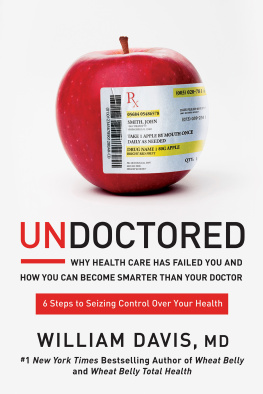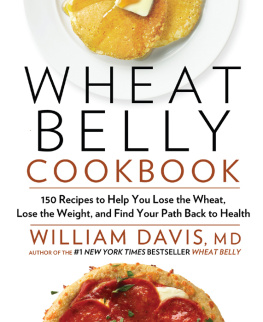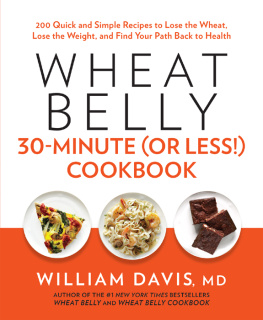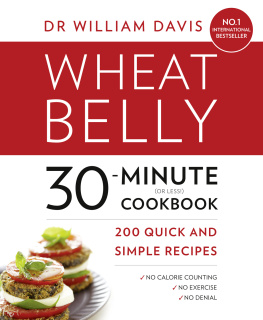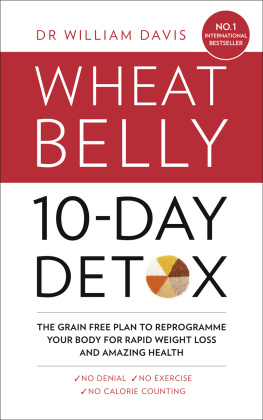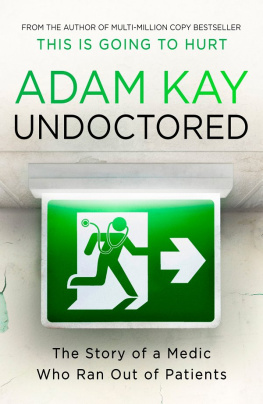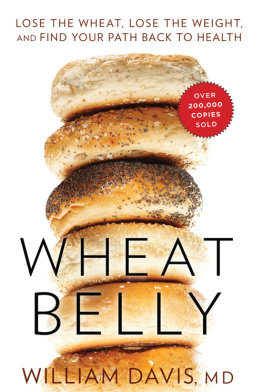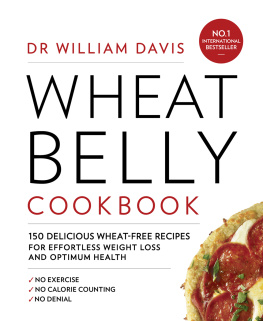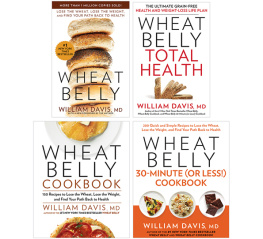
This book is intended as a reference volume only, not as a medical manual. The information given here is designed to help you make informed decisions about your health. It is not intended as a substitute for any treatment that may have been prescribed by your doctor. If you suspect that you have a medical problem, we urge you to seek competent medical help.
The author has made every effort to ensure that the accuracy of the information within this book was correct at time of publication. The author does not assume and hereby disclaims any liability to any party for any loss, damage, or disruption caused by errors or omissions, whether such errors or omissions result from accident, negligence, or any other cause.
Mention of specific companies, organizations, or authorities in this book does not imply endorsement by the author or publisher, nor does mention of specific companies, organizations, or authorities imply that they endorse this book, its author, or the publisher.
Internet addresses and telephone numbers given in this book were accurate at the time it went to press.
2017 by William Davis, MD
All rights reserved. No part of this publication may be reproduced or transmitted in any form or by any means, electronic or mechanical, including photocopying, recording, or any other information storage and retrieval system, without the written permission of the publisher.
Book design by Amy King
Library of Congress Cataloging-in-Publication Data is on file with the publisher.
ISBN 9781623368661 trade hardcover
ISBN 9781623368678 e-book

We inspire health, healing, happiness, and love in the world.
Starting with you.
RodaleWellness.com
Dedicated to all the readers who recognize that health is something achieved through individual effort and has almost nothing to do with doctors or the healthcare system.
Contents
Introduction
I think the biggest innovations of the 21st century will be at the intersection of biology and technology. A new era is beginning.
Steve Jobs
W ho doesnt love a gripping medical drama? Remember the George Clooney character on the TV series ER, pediatrician, womanizer, rebel-with-a-heart Dr. Doug Ross? Add characters like the cane-wielding Dr. Kerry Weaver and lovable nurse Abby Lockhart, and youve got the formula for a medical drama that addicted a generation of viewers, portraying health care as fast-paced and thrilling, flawed but well intentioned, and thoroughly human.
But thats TVdramatized, idealized, sanitized. The private side of real health care is something altogether different. The bulk of what goes on in health care every day involves no drama, no urgency, no critical life or death decisions, no George Clooney winning smile, no surreptitious kisses in corners of the supply room. Having practiced medicine for over 25 years, I can tell you from personal experience that most health care involves routine, humdrum issues like blood pressure and bloating, bedsores and bladder infections, cost and copay and does not invite good-looking actors to play out drama as gripping as a case of itchy hemorrhoids.
Though as dull as dishwater, health care is big money. In 2014, we spent a total of $3 trillion nationally on health care ($9,523 per person), accounting for 17.5 percent of gross domestic product, compared to the 10 to 12 percent other developed countries spend with healthcare systems that match or exceed the United States in quality. Despite the dominance of glistening medical center images in the popular perception of health care, less than
Many modern doctors hold themselves up as all-knowing, capable of managing every aspect of health, from delivery to death, from vaccination to senility. I know because I was guilty of this. The Im-the-doctor, youre-the-patient relationship has been frozen in time since the days of Hippocrates. Despite the high-tech image, old-fashioned methods are still used to maintain paternalistic authority. Doctoring means wearing a white coat to impress ignorant, helpless patients, the appearance of authority designed to exploit the power of the placebo, long waiting room stays erected as barriers to the privilege of gaining the wisdom of presumed experts, while the monolithic world of medical billing remains impenetrable. All of it seems positively fossilized in an age of immediate information access, on-demand videos, drone deliveries, and the democratization of discussion via social media. Doctors hold themselves up as the gatekeepers of health information and regard the average person as ill-informed and inexperienced, a health simpleton who is powerless in administering any aspect of health. In what other industry can the provider of a service operate with such disregard for customer satisfaction? Imagine buying a car from a salesperson who used intimidation to raise prices, refused to answer questions, and brushed off your concerns as those of a naive automotive nonexpert; I doubt youd drive off happily in a new hybrid convertible.
The information tide has shifted. Public ignorance in health may have been the rule in 1950, but rapid dissemination of information in our age has usurped this lopsided relationship, making the paternalistic doctor-patient relationship of the past as relevant as trepanation (drilling holes in the skullyes, a real practice) to treat migraines. You have access to the same information as your doctor. And it doesnt involve leafing through dozens of thick volumes of the Index Medicus and then having to retrieve a study from dusty stacks of medical journals, like I did during my medical training. The newly leveled playing field of immediately accessible information means that a new clinical study read by your neurologist or gynecologist is available to you with a few mouse clicks. The cultlike, guarded monopoly over health information is long gone, replaced by immediate, widespread information readily accessible to everyone. The resources available to us have exploded. And they continue to increase at an exponential rate.
The growth in medical information means that the education your doctor received during medical school and training is dusty, moth-ridden, and And information growth is not just within medicine but also in other areas that impact human health, such as toxicology, due to the proliferation of industrial toxins in the environment that disrupt endocrine health and increase risk for cancer, or environmental science and urban planning, since city noise, smog, congestion, and stress all affect various aspects of health. No living human can keep up with the information load and hope to provide up-to-date health care, no matter how smart, how hardworking, how fancy their equipment, or how many operating rooms they have. Dealing with this boom in health information requires new tools to organize it all, put it to practical use, and extract maximum health benefit.
What if we combined the newly found informational freedom provided by Internet search capabilities with the human feedback tool of social media and the rise in direct-to-consumer testing that circumvents the doctor, then threw in a little benign guidance from sources that do not seek to profit from providing it? You might just be on your way to wielding considerable authority over your own health. When you apply the methods unique to the Information Age, unconcerned with ritual, intimidation, and profit, to your health, some pretty darned incredible things can happen: Weight melts away effortlessly, joint pain and skin rashes recede, acid reflux and irritable bowel syndrome symptoms reverse within days, fibromyalgia and ulcerative colitis begin a powerful retreat, prescription medications become superfluousall by sharing in a growing collective information exchange.

